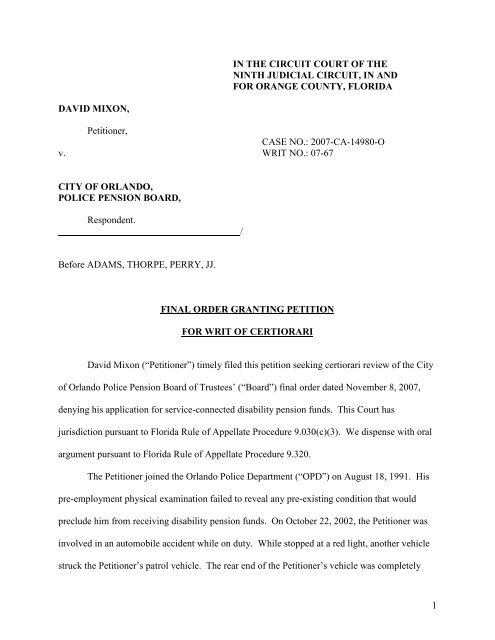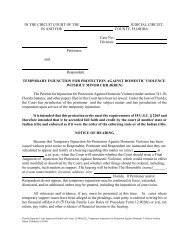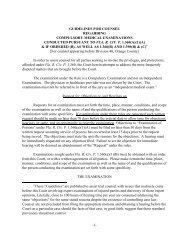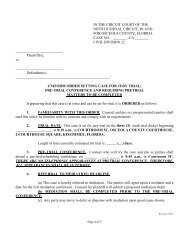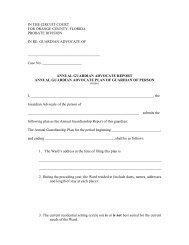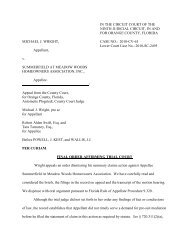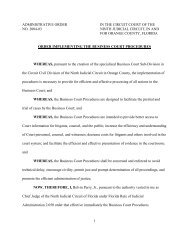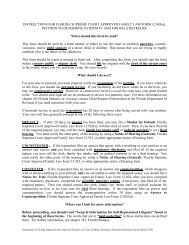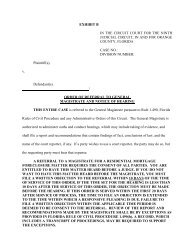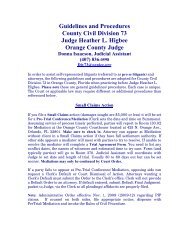confidential non-public document pursuant to florida rule of judicial ...
confidential non-public document pursuant to florida rule of judicial ...
confidential non-public document pursuant to florida rule of judicial ...
Create successful ePaper yourself
Turn your PDF publications into a flip-book with our unique Google optimized e-Paper software.
IN THE CIRCUIT COURT OF THENINTH JUDICIAL CIRCUIT, IN ANDFOR ORANGE COUNTY, FLORIDADAVID MIXON,Petitioner,CASE NO.: 2007-CA-14980-Ov. WRIT NO.: 07-67CITY OF ORLANDO,POLICE PENSION BOARD,Respondent./Before ADAMS, THORPE, PERRY, JJ.FINAL ORDER GRANTING PETITIONFOR WRIT OF CERTIORARIDavid Mixon (“Petitioner”) timely filed this petition seeking certiorari review <strong>of</strong> the City<strong>of</strong> Orlando Police Pension Board <strong>of</strong> Trustees’ (“Board”) final order dated November 8, 2007,denying his application for service-connected disability pension funds. This Court hasjurisdiction <strong>pursuant</strong> <strong>to</strong> Florida Rule <strong>of</strong> Appellate Procedure 9.030(c)(3). We dispense with oralargument <strong>pursuant</strong> <strong>to</strong> Florida Rule <strong>of</strong> Appellate Procedure 9.320.The Petitioner joined the Orlando Police Department (“OPD”) on August 18, 1991. Hispre-employment physical examination failed <strong>to</strong> reveal any pre-existing condition that wouldpreclude him from receiving disability pension funds. On Oc<strong>to</strong>ber 22, 2002, the Petitioner wasinvolved in an au<strong>to</strong>mobile accident while on duty. While s<strong>to</strong>pped at a red light, another vehiclestruck the Petitioner’s patrol vehicle. The rear end <strong>of</strong> the Petitioner’s vehicle was completely1
destroyed. The Petitioner was taken <strong>to</strong> the hospital by ambulance where he was treated andreleased.Subsequent <strong>to</strong> the accident the Petitioner suffered from extreme pain in his lower backand sought treatment from Dr. Grady McBride who prescribed physical therapy and shots for hispain. Additionally the Petitioner was treated by a chiroprac<strong>to</strong>r, Dr. Dennis Filosa, whoconcluded that the Petitioner’s injury was the result <strong>of</strong> his au<strong>to</strong> accident, and not the result <strong>of</strong> apre-existing injury. The Petitioner returned <strong>to</strong> work while undergoing pain management shotsand utilizing a lighter, nylon gun belt in an effort <strong>to</strong> minimize the strain on his back.Petitioner’s second on-duty au<strong>to</strong> accident occurred on Oc<strong>to</strong>ber 17, 2005, while travellingon the interstate. His patrol vehicle was caught between two other vehicles in the front and rear.The resulting injuries <strong>to</strong> the Petitioner’s neck and back caused him severe and intense pain.Following medical treatment the Petitioner was placed on modified duty, effectively limiting hisphysical activity in order <strong>to</strong> help manage his pain.Petitioner pursued all medical options, save for surgical fusion <strong>of</strong> vertebrae in his lowerback, <strong>to</strong> relieve his pain. His doc<strong>to</strong>r’s informed him that in any event surgery would still leavethe Petitioner in a condition where he would be unable <strong>to</strong> fulfill the requisite duties <strong>of</strong> a police<strong>of</strong>ficer. With that being the case, the Petitioner chose <strong>to</strong> file his line <strong>of</strong> duty disability pensionapplication with the Board.On September 24, 2007, an evidentiary hearing was held before the Board. The evidenceincluded testimony by the Petitioner; deposition and physicians’ reports by Dr. Faissal Zahrawi,who conducted the Independent Medical Exam (“IME”), and Dr. Alexander Jungreis; as well asphysician reports from Dr. Grady McBride and Dr. Michael Broom.2
Dr. McBride found that the Petitioner suffered from: (1) lumbosacral strain, (2) L5-S1spondylolisthesis, and (3) bilateral carpal tunnel syndrome, after his 2002 accident. In hisopinion, the Petitioner’s symp<strong>to</strong>ma<strong>to</strong>logy resulted from his accidents. Eventually Dr. McBridedetermined that the Petitioner reached maximum medical improvement (MMI) and 0% PPI forhis 2002 accident. He cleared the Petitioner for return <strong>to</strong> regular work duty as <strong>of</strong> April 30, 2003.Following the Petitioner’s second accident, Dr. McBride diagnosed the Petitioner with: (1)cervical strain, (2) cervical degenerative disc disease, and (3) small disc herniation at C6-7. Asthe Petitioner was being treated by another doc<strong>to</strong>r for his lower back, Dr. McBride found that thePetitioner had reached MMI for his cervical spine and cleared him for return <strong>to</strong> regular duty.Dr. Alexander Jungreis examined the Petitioner on numerous occasions beginning inMarch 2003. His initial diagnosis was that the Petitioner suffered from: (1) lumbarspondylolysis and (2) lumbar dys<strong>to</strong>nia secondary <strong>to</strong> lumbar spondylosis. After numerous MRI’s,Dr. Jungreis’s assessment <strong>of</strong> the Petitioner was that he suffered from: (1) lumbar spondylosis, (2)bilateral L5 pars defect without anterolisthesis, (3) lumbar herniated disc, and (4) chronic painsyndrome. In preparing his physician’s report for the Board, Dr. Jungreis gave the Petitioner a9% disability rating and indicated that the Petitioner could not return <strong>to</strong> normal duty, even if asuccessful surgical fusion was performed. Finally, <strong>to</strong> the best <strong>of</strong> his knowledge, Dr. Jungreisstated that the Petitioner’s injury was sustained in the line <strong>of</strong> duty and not due <strong>to</strong> a pre-existingmedical condition.Dr. Michael Broom examined the Petitioner after Dr. Jungreis referred him there for asurgical evaluation. An MRI from December 2005, revealed desiccation at L5-S1 with mildprotrusion and high intensity zone, L5 pars defect and slight spondylosthesis <strong>of</strong> L5-S1. Inpreparing his physician’s report for the Board, Dr. Broom gave the Petitioner an 8% disability3
ating and indicated that the Petitioner’s 2005 accident aggravated his condition. Dr. Broom alsonoted that the Petitioner’s L5 pars defect and spondylolisthesis were present prior <strong>to</strong> 2005. OnMay 30, 2007, Dr. Broom added an addendum <strong>to</strong> the Petitioner’s file stating that after reviewingthe Petitioner’s pre-employment x-rays he saw evidence <strong>of</strong> probable L5 pars defects, but noevidence <strong>of</strong> spondylolisthesis. 1Dr. Faissal Zahrawi performed the Board’s Independent Medical Examination (IME) onthe Petitioner. He concluded that the Petitioner had a bulged L5-S1 disc and bilateralspondylolysis, but no spondylolisthesis. In Dr. Zahrawi’s IME report, he stated that thePetitioner had a preexisting condition and the positive effects were not a result <strong>of</strong> a mo<strong>to</strong>r vehicleaccident. The Petitioner’s mo<strong>to</strong>r vehicle accidents aggravated his back problems that had beenpresent prior <strong>to</strong> his employment. In Dr. Zahrawi’s opinion, the Petitioner could perform mostactivities expected <strong>of</strong> a police <strong>of</strong>ficer.After the hearing the Board concluded that the Petitioner was permanently and <strong>to</strong>tallydisabled, the first prong in the Board’s standard procedure <strong>to</strong> determine pension eligibility. TheBoard next concluded that the Petitioner suffered from a preexisting condition, the aggravation<strong>of</strong> which caused his present condition. On this basis, the Board denied the Petitioner’sapplication for line <strong>of</strong> duty disability retirement. The Board issued a Final Order stating theirconclusions, and it is from this Final Order that the Petitioner seeks review before this Court.The Court’s review <strong>of</strong> an administrative agency decision is governed by a three-partstandard <strong>of</strong> review: (1) whether procedural due process was accorded; (2) whether the essentialrequirements <strong>of</strong> the law were observed; and (3) whether the decision was supported by1 Dr. Broom’s physician’s report indicates L5 pars defect since childhood, and spondylolisthesis existing prior <strong>to</strong> theinjury. His addendum, however, indicates no spondylolisthesis on his pre-employment x-ray. The record does notclarify whether Dr. Broom is contradicting himself, or if he believes that the spondylolisthesis developed betweenchildhood and the second accident.4
competent substantial evidence. Haines City Cmty. Dev. v. Heggs, 658 So. 2d 530 (Fla. 1995).“It is neither the function nor the prerogative <strong>of</strong> a circuit judge <strong>to</strong> reweigh evidence and makefindings [<strong>of</strong> fact] when [undertaking] a review <strong>of</strong> a decision <strong>of</strong> an administrative forum.” Dep’<strong>to</strong>f Highway Safety & Mo<strong>to</strong>r Vehicles v. Allen, 539 So. 2d 20, 21 (Fla. 5 th DCA 1989).Petitioner presents two arguments in his petition for writ <strong>of</strong> certiorari. First he argues thatthe Board’s decision was not supported by competent substantial evidence, and that the decisionconstituted a departure from the essential requirements <strong>of</strong> law. Second the Petitioner argues thathe is entitled <strong>to</strong> disability pension <strong>pursuant</strong> <strong>to</strong> state statute and supporting case law. He arguesthat the Board’s decision denying his application therefore constituted a departure from theessential requirements <strong>of</strong> law. The responsibility <strong>of</strong> this Court is <strong>to</strong> determine whether sufficientevidence was presented <strong>to</strong> the Board for an informed decision <strong>to</strong> be made. Should this Court andthe Board disagree about the proper result in this case, the opinion <strong>of</strong> this Court cannot replacethe decision <strong>of</strong> the Board. Prior case law instructs this Court, “that it is neither the function northe prerogative <strong>of</strong> the circuit court <strong>to</strong> reweigh evidence and make findings [<strong>of</strong> fact] when[undertaking] a review <strong>of</strong> a decision <strong>of</strong> an administrative forum.” Dept. <strong>of</strong> Highway Safety &Mo<strong>to</strong>r Vehicles v. Allen, 539 So. 2d 20, 21 (Fla. 4th DCA 1989).With regards <strong>to</strong> the Petitioner’s first argument, the Board ultimately relied on Dr.Zahrawi’s opinion that the Petitioner was disabled due <strong>to</strong> aggravation <strong>of</strong> a preexisting condition.The deposition testimony and exhibits from Dr. Zahrawi were entered in<strong>to</strong> evidence at theBoard’s hearing. After reviewing Dr. Zahrawi’s testimony in whole, along with the medicalexhibits and reports submitted with this petition for writ <strong>of</strong> certiorari, this Court finds that theBoard relied on competent substantial evidence in denying the Petitioner’s pension application.5
This decision follows directly from precedent set out by the Fourth District Court <strong>of</strong>Appeal. This Court must follow the decision set out in Pompano Beach Police & Firemen’sPension Fund v. Franza, 405 So. 2d 446 (Fla. 4th DCA 1981). In Franza, two doc<strong>to</strong>r’s testifiedthat a pension applicant (the police chief <strong>of</strong> Pompano Beach) was not able <strong>to</strong> perform the tasksrequired <strong>of</strong> his position, and a third doc<strong>to</strong>r stated that the applicant could perform most tasks butexpressed concern that the applicant could not handle the responsibility <strong>of</strong> the position <strong>of</strong> policechief. Id. at 447. A fourth doc<strong>to</strong>r disagreed completely with his colleagues and stated that theapplicant could perform the duties <strong>of</strong> the <strong>of</strong>fice involved. Id. That Board relied on the fourthdoc<strong>to</strong>r’s testimony and denied the pension application. Id. After reversal by the circuit court, theFourth District Court <strong>of</strong> Appeal reversed the decision <strong>of</strong> the circuit court, stating: “[s]ince wefind the record contains substantial competent evidence supporting the agency decision, it waserror for the circuit court in its appellate capacity <strong>to</strong> overturn that decision.” Id.The instant case analogizes with the decision in Franza. The Board here used thetestimony <strong>of</strong> a single doc<strong>to</strong>r, Dr. Zahrawi, as their basis for denying the Petitioner’s applicationfor disability pension. In Franza, the court stated: “his testimony, though in conflict with theother doc<strong>to</strong>rs in varying degrees, is neither inherently incredible nor improbable and thus it aloneconstitutes substantial competent evidence upon which the [Board] could rest their decision.” Id.Likewise this Court finds that Dr. Zahrawi’s testimony is neither inherently incredible norimprobable and therefore constitutes competent substantial evidence upon which the Boardrendered their decision.Petitioner next argues that he is entitled <strong>to</strong> line <strong>of</strong> duty disability pension <strong>pursuant</strong> <strong>to</strong>Chapter 185, Florida Statutes and the holding from Crawley v. Orlando Firefighter’s PensionBoard <strong>of</strong> Trustees, 10 Fla. L. Weekly 951a (Fla. 9th Cir. Ct. June 23, 2003). He contends that6
the Board departed from the essential requirements <strong>of</strong> law by failing <strong>to</strong> follow these two sources<strong>of</strong> legal authority.Chapter 12, Article I, <strong>of</strong> the Orlando City Charter sets forth the pension fund andretirement plan (“Plan”) that is applicable <strong>to</strong> members <strong>of</strong> the OPD. It was adopted in 1943<strong>pursuant</strong> <strong>to</strong> a special act <strong>of</strong> the Florida Legislature. Ch. 22414, Laws <strong>of</strong> Fla. (1943). Section 9 <strong>of</strong>the Plan governs line <strong>of</strong> duty disability pension and provides that “[a]ny active member <strong>of</strong> thepolice department who shall become permanently and disabled, if the disability is directly causedby and attributable <strong>to</strong> the performance <strong>of</strong> duty as a member <strong>of</strong> the department, shall be entitled <strong>to</strong>a monthly pension . . . .” Orlando, Fla., Charter, ch.12, art. I, 9(1), (2007).In addition <strong>to</strong> the Plan provisions, special acts and ordinances creating and amending theOrlando Police Pension Plan, the Plan is governed by Chapter 185, Florida Statutes. In 1999, theFlorida Legislature amended Chapter 185 with Chapter 99-1, Laws <strong>of</strong> Florida (1999). Theseamendments clarified a question as <strong>to</strong> whether or not local law plans (like the Orlando PolicePension Plan) were required <strong>to</strong> comply with Chapter 185, and therefore provide minimumbenefits and meet minimum standards for their plans. Accordingly Chapter 185, Florida Statuteswas amended <strong>to</strong> read:This chapter hereby establishes, for all municipal pension plans now or hereinafterprovided for under this chapter, including chapter plans and local law plans,minimum benefits and minimum standards for the operation and funding <strong>of</strong> such plans,hereinafter referred <strong>to</strong> as municipal police <strong>of</strong>ficers’ retirement trust funds.§185.01(2), Fla. Stat. (2007).In addition <strong>to</strong> clarifying the issue <strong>of</strong> local law plan compliance with Chapter 185, theamendments provided that minimum benefits were also <strong>to</strong> be based on the availability <strong>of</strong> revenue<strong>to</strong> fund them.7
Citing Chapter 185, the Petitioner informs this Court that the Orlando Police PensionPlan (and the other local law plans in effect on Oc<strong>to</strong>ber 1, 1998), “shall be required <strong>to</strong> complywith the minimum benefit provisions <strong>of</strong> this chapter only <strong>to</strong> the extent that additional premiumtax revenues become available <strong>to</strong> incrementally fund the cost <strong>of</strong> such compliance as provided ins. 185.16(2).” §185.35, Fla. Stat. (2007). Petitioner argues that from a plain reading <strong>of</strong> section185.35 minimum benefits can be only be incrementally increased, as funds become available, forregular retirement pensions. Section 185.35 specifically references section 185.16(2), and notthe disability pension section 185.18.To support this contention the Petitioner presents the Crawley case. The court inCrawley reviewed a similar petition for writ <strong>of</strong> certiorari, concerning a pension board’s denial <strong>of</strong>a firefighter’s line <strong>of</strong> duty disability pension application. Crawley, 10 Fla. L. Weekly Supp. 951a(Fla. 9th Cir. Ct. June 23, 2003). Our sister panel in the same circuit reviewed Crawley’spetition under Florida Statues Chapter 175. While we recognize the Respondent’s argument thatthis is a different chapter from the instant case, this Court would be remiss <strong>to</strong> not consider thereasoned approach <strong>of</strong> the Crawley court.On appeal, the Crawley court acknowledged the pension board’s argument that section175.351, “allows for a local law plan <strong>to</strong> wait until additional premium tax revenues becomeavailable <strong>to</strong> seek amendments <strong>to</strong> the local law plan which would provide extra benefits <strong>to</strong>firefighters.” Id. The court, however, made an important distinction in finding that theminimum benefits referred <strong>to</strong> in section 175.351(b) were those set out by section 175.162(2)(a),and not those contained within the disability pension section. Id.They found that since the board had not found Crawley <strong>to</strong> be permanently disabled basedon one <strong>of</strong> the four enumerated disability exceptions in 175.191(3), her pension application8
should not have been denied. Id. With that decision, the Crawley court granted the petition forwrit <strong>of</strong> certiorari and quashed the pension board’s final order denying her disability pensionapplication. Id.Just as Florida Statutes Chapter 175 was drafted with firefighter’s pensions in mind,Chapter 185 was drafted <strong>to</strong> provide for police <strong>of</strong>ficer’s pensions. Sections <strong>of</strong> both chaptersmirror each other, and the reasoning behind the Crawley decision, while not controlling, iscertainly highly persuasive <strong>to</strong> this Court. Section 185.35, as previously mentioned, provides thatcompliance with the minimum benefits requirement is necessary “only <strong>to</strong> the extent thatadditional premium tax revenues become available <strong>to</strong> incrementally fund the cost <strong>of</strong> suchcompliance as provided in s. 185.16(2).” §185.35, Fla. Stat. (2007).Exactly as it appears in Chapter 175, section 185.35 refers back <strong>to</strong> the section relating <strong>to</strong>regular retirement benefits (section 185.16(2)), and not the disability pension section (section185.18). Just as Chapter 175 enumerates four exceptions <strong>to</strong> disability retirement, Chapter 185presents five exceptions:(3) A police <strong>of</strong>ficer will not be entitled <strong>to</strong> receive any disability retirementincome if the disability is a result <strong>of</strong>:(a) Excessive and habitual use by the police <strong>of</strong>ficer <strong>of</strong> drugs,in<strong>to</strong>xicants, or narcotics;(b) Injury or disease sustained by the police <strong>of</strong>ficer while willfully andillegally participating in fights, riots, civil insurrections or whilecommitting a crime;(c) Injury or disease sustained by the police <strong>of</strong>ficer while serving in anyarmed forces;(d) Injury or disease sustained by the police <strong>of</strong>ficer after employment hasterminated;(e) Injury or disease sustained by the police <strong>of</strong>ficer while working foranyone other than the city and arising out <strong>of</strong> such employment.§185.18(3), Fla. Stat. (2007).9
Pre-existing conditions are not present in this list <strong>of</strong> exceptions, as the Petitioner correctlyargues. This Court believes that the Board failed <strong>to</strong> recognize that they could not denyPetitioner’s pension application based solely on the existence <strong>of</strong> a pre-existing condition.In conclusion, the City <strong>of</strong> Orlando Police Pension Board was within their purview inrelying solely on Dr. Zahrawi’s testimony regarding the Petitioner’s fitness for duty. However,in line with the decision in Crawley, the Board should not have denied the disability applicationas a pre-existing condition is not one <strong>of</strong> the five enumerated exceptions <strong>to</strong> receiving a disabilityretirement pension.Accordingly, it is hereby ORDERED and ADJUDGED that Petitioner David Mixon’sPetition for Writ <strong>of</strong> Certiorari is GRANTED and the Final Order <strong>of</strong> the City <strong>of</strong> Orlando PolicePension Board <strong>of</strong> Trustees is QUASHED.It is FURTHER ORDERED and ADJUDGED that Petitioner David Mixon’s Motionfor At<strong>to</strong>rneys’ Fees and Costs is GRANTED, the assessment <strong>of</strong> which is REMANDED <strong>to</strong> thelower court.It is also FURTHER ORDERED and ADJUDGED that Petitioner David Mixon shallhave costs taxed in his favor, if he files a proper motion <strong>pursuant</strong> <strong>to</strong> Florida Rules <strong>of</strong> AppellateProcedure 9.400(a) with the lower tribunal within thirty days <strong>of</strong> the issuance <strong>of</strong> the mandate inthis matter.DONE AND ORDERED in Chambers, at Orlando, Orange County, Florida on this_18__day <strong>of</strong> _____June___, 2009._____/S/_______________________JANET C. THORPECircuit Judge_________/S/____________________JOHN H. ADAMSCircuit Judge______/S/_______________________BELVIN PERRYCircuit Judge10
CERTIFICATE OF SERVICEI HEREBY CERTIFY that a true and correct copy <strong>of</strong> the foregoing Order has beenfurnished via U.S. mail <strong>to</strong>:Erin J. O’Leary, Esq., Brown, Garganese, Weiss & D’Agresta. P.A., 225 East Robinson Street,Suite 660, P.O. Box 2873, Orlando, FL 32802-2873Robert D. Klausner, Esq., Stuart A. Kaufman, Esq., and Adam P. Leviten, Esq., Klausner &Kaufman, P.A., 10059 N.W. 1st Court, Plantation, FL 33324Jay L. Smith, Police Pension Board <strong>of</strong> Trustees, 100 S. Hughey Avenue, Orlando, FL 32801Lee Ann Freeman, Orlando Police Department Advocate, 100 S. Hughey Avenue, Orlando, FL32801______/S/_______________________Judicial Assistant11


